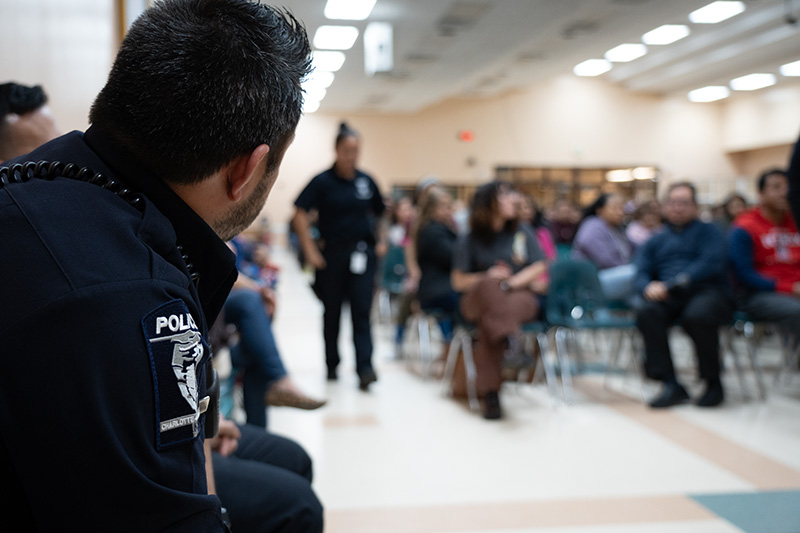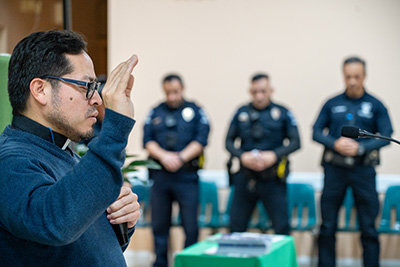‘Do not be afraid’
 CHARLOTTE — Church and lay leaders across the Diocese of Charlotte are providing spiritual support and practical guidance for immigrants worried about getting swept up by immigration enforcement actions promised by President Donald Trump.
CHARLOTTE — Church and lay leaders across the Diocese of Charlotte are providing spiritual support and practical guidance for immigrants worried about getting swept up by immigration enforcement actions promised by President Donald Trump.
Raids by U.S. Immigration and Customs Enforcement (ICE) have not materialized locally so far, and most pastors report little change in Mass attendance. Yet more than a dozen priests, Catholic Charities and Hispanic Ministry workers interviewed say immigrants and their families are living in fear, avoiding nonessential travel, and taking steps to protect themselves – from researching their rights, to seeking documented status, to diverting their spending toward car repairs so they won’t entice police to stop them for equipment issues.
Around the country, some immigrants are skipping work or school when ICE activity seems close, according to media reports. Locally, even immigrants who are naturalized citizens are carrying their official documents everywhere. Priests in the Charlotte and Greensboro areas are counseling parents who are struggling to explain to their children the potential threat without traumatizing them.
“Many people are afraid – especially children, who wonder what would happen if ICE takes their mom or dad, or both together,” says Deacon Enedino Aquino, the diocese’s Hispanic Ministry coordinator in Greensboro.
Among other measures aimed at immigrants, the Trump administration rescinded a long-standing policy that restricted immigration enforcement in “sensitive locations” such as churches, schools and hospitals.
Still, immigrants are turning to the Church for support. And she is responding.
In Charlotte, one predominantly Hispanic parish recently hosted Charlotte-Mecklenburg Police officers for a conversation with 200 immigrants. Other parishes are presenting “Know Your Rights” seminars. Rumors are rampant, falsely warning of pending raids and recounting tales of crimes against immigrants. The priest at one mountain parish called sheriffs’ departments in several counties to inquire about their policies. Another pledged to “defend” the families in his parish “to the last consequences.”
“We are here to help you, not to harm you,” CMPD Officer Verónica Cruz told the 200 immigrants who turned out Feb. 6 at Our Lady of Guadalupe Church to learn more about local policing.
She said an alarming percentage of robberies are committed against Hispanics and that Charlotte has seen a noticeable decline in crime reporting, since many Hispanics worry their immigration status could be questioned if they call police.
Vincentian Father Marvin Navas introduced the five police officers at the event as “friends” of the community and urged the crowd to pray for them because their daily duties pose danger.
“I came with fear, and I leave more at ease,” said Dilman, a parishioner from Guatemala who gave his first name only, after the presentation.
“I’m satisfied with the answers they gave us,” said Juan Esteban Tirado, also in attendance. “Now, as they say, without fear or worry, I’ll take this information to my friends and family.”
‘Welcoming the stranger’
 Vincentian Father Marvin Navas blesses Charlotte-Mecklenburg Police officers and 200 members of the immigrant community Feb. 6 at Our Guadalupe Church for a conversation on local policing.(Photos by César Hurtado)Across the country, the Church is challenging policy and providing practical advice for immigrants.
Vincentian Father Marvin Navas blesses Charlotte-Mecklenburg Police officers and 200 members of the immigrant community Feb. 6 at Our Guadalupe Church for a conversation on local policing.(Photos by César Hurtado)Across the country, the Church is challenging policy and providing practical advice for immigrants.
From coast to coast, Catholic bishops have been speaking out against mass deportation and the targeting of sensitive areas for immigration crackdowns.
“We stand with you,” Charlotte Bishop Michael Martin said in a message to immigrants days before the inauguration. “Do not be afraid.”
In a separate message Feb. 5, Bishop Martin and Raleigh Bishop Luis Zarama published a joint statement, saying: “Our Catholic Charities offices stand ready to help with food and other household necessities for all families. As Catholics, we advocate for the recognition that immigrants, as members of God’s human family, are deserving of and must be granted the appropriate dignity as our brothers and sisters in the Lord. Jesus Himself was a refugee and taught us to welcome the stranger and to realize that in welcoming the stranger, we are welcoming Christ Himself.”
Church leaders are careful to affirm the government’s right to regulate its borders and control immigration and say they don’t condone or counsel anyone to break the law. But the bishops have also implored the government to respect religious freedom, keep families united and, as the Church teaches, always uphold the human rights and dignity of every person.
The pope himself has repeatedly weighed in on the issue. While every nation has the right to defend itself and keep its communities safe, he said in a letter to U.S. bishops issued Feb. 11, “the act of deporting people who in many cases have left their own land for reasons of extreme poverty, insecurity, exploitation, persecution or serious deterioration of the environment, damages the dignity of many men and women, and of entire families, and places them in a state of particular vulnerability and defenselessness."
Trump administration officials have clashed openly with the U.S. bishops, questioning their motives and threatening to cut federal funding to Catholic Charities over its service to legal refugees brought to the country by the U.S. government. Despite misinformation that causes confusion, Church funding is not used to facilitate immigration by people who are coming to the country without government approval.
Nevertheless, no matter what someone’s legal status is, the Church provides the sacraments as well as humanitarian relief at its food pantries, clothing closets and other services.
Inside churches, clergy throughout the diocese are also expressing support from the pulpit and in other ways. A Mooresville pastor is among those who shared encouraging words in his church bulletin.
“This (bulletin) and the letter from the bishops has brought people a bit of joy,” says Hispanic Ministry Coordinator Ibis Centeno, “because they feel that there is some solidarity.”
Father Peter Ascik, who pastors a church of 400 families, about half of them Hispanic, says, “People have expressed anxiety and uncertainty about what’s going to happen and who is going to be targeted. There are concerns that people will be targeted at church, or trying to get to church, and they might be afraid to come to church events because of that risk.”
That’s disconcerting, Father Ascik says, because “the Catholic Church affirms that, whether documented or undocumented, migrants have a right to receive spiritual care without fear and for their family integrity to be respected.”
Father Ascik calls it a privilege to serve the immigrant community. “I have come to know they are hard-working, faith-filled and family-oriented. They are a vital part of our parish, and many have been contributing to our local community for years.”
Churches also are sharing practical advice:
- Keep your car in good working order.
- Make sure the license plate is current.
- Don’t speed and obey all traffic signs and laws.
- Carry your identification everywhere. Police recommend a passport.
- Designate a family meeting place and have a plan in case one of you is detained.
- Be courteous if you are stopped by police.
“I know there’s a lot of stress when you are stopped by the police,” Officer Claudio Jiménez told visitors at Our Lady of Guadalupe. But he noted traffic stops are stressful for police, too, because they never know what they might encounter.
“We are not ICE,” Jiménez said. Charlotte-Mecklenburg Police do not function as immigration officers and are not required to assist in federal operations. “We do not take people for not having a driver’s license, but we need to identify you,” he said.
St. Peter, the oldest active parish in the diocese, operates a robust social justice ministry that includes outreach and assistance for legal refugees, but also advocates for the humane treatment of undocumented immigrants.
“We know it is a trying time and we are here to help people because the ramifications of this are enormous,” says Jesuit Father Tim Stephens, pastor. “We read the horror stories and try to figure out our role in all this, and I’d say it is probably to help wherever we can, even if it is just holding someone’s hand while justice or inevitability takes its course.”
— Liz ChandlerCésar Hurtado, Lisa Geraci and OSV News contributed


